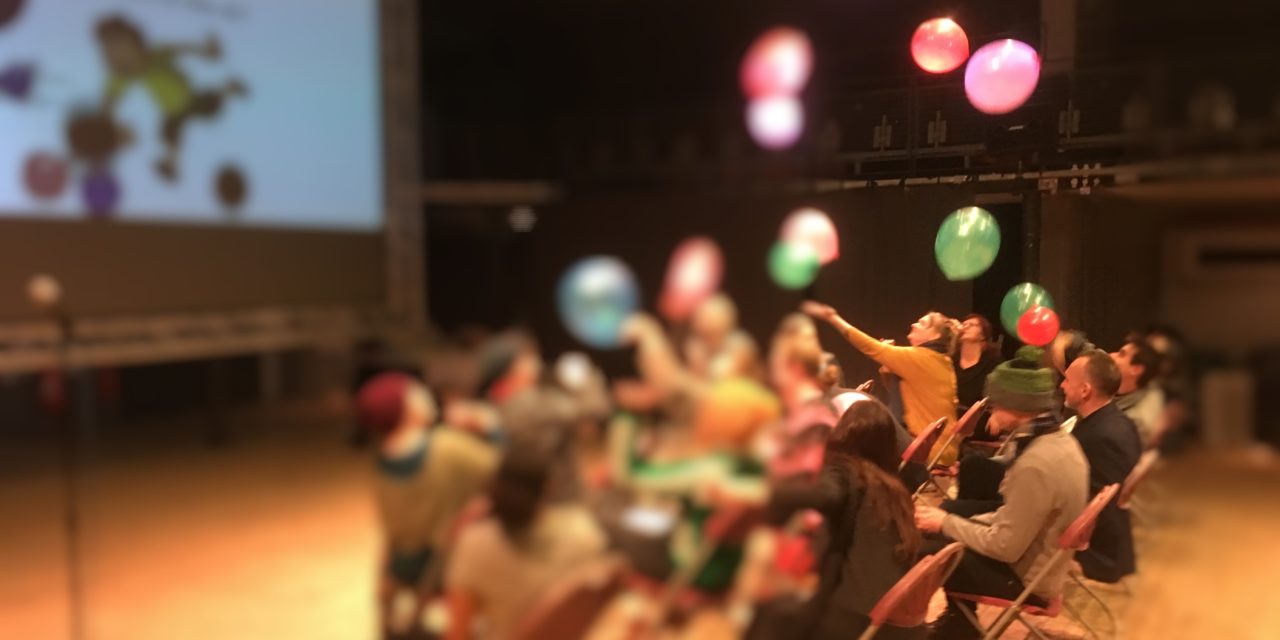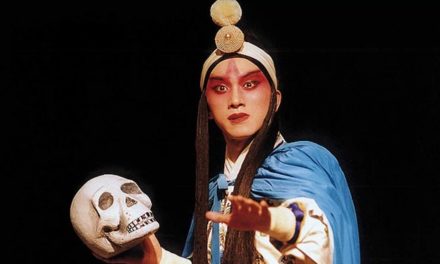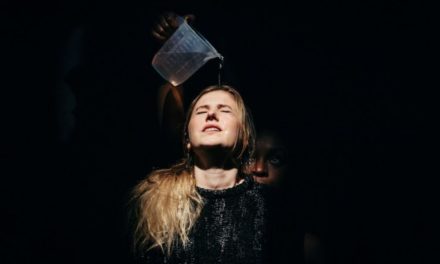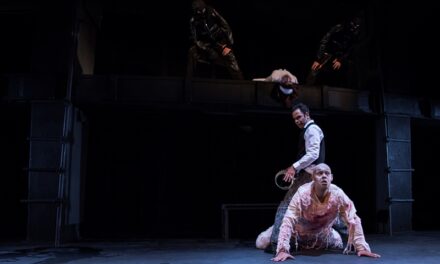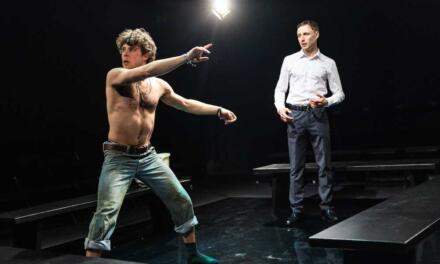Translator and theatre scholar Dr. Jozefina Komporaly reflects on a day of exchange between the worlds of research, practice, and immersive theatre, with adaptation and interactivity at its core.
This article aims to highlight converges and confluences between professional performance practice, academia, and the general public, drawing on an event that situated the day-to-day work of theatre practitioners, aspects of performance criticism, and the notion of work in progress side by side. The venue, however, was not the familiar territory of a break-out space or rehearsal room regularly used by theatre professionals, but the Theatre @ Wimbledon College of Arts, University of the Arts, London (UAL), and those in attendance included theatre practitioners, critics, and academics as well as students and members of the general public. Although these terms were not foregrounded explicitly in the event’s title, the experience was very much underpinned by intimacy and trust–as the proceedings were only partially concerned with discussing fully completed work already available in the public domain, and were firmly anchored within the ins and outs of rehearsal processes. In this way, the terms “participation” and “risk-taking” located at the core of the event gained additional resonance, as the day started with theatre-makers sharing some of their most confidential warm-up and rehearsal techniques, and ended with the participants’ candid reflections on their personal memories of past performance experiences.
On March 3, 2018, Wimbledon College of Arts hosted the event Adaptation, Participation, Risk-taking: Creative Interventions In Contemporary Performance–an interactive performance workshop run by Anglo-Brazilian performance company ZU-UK, followed in the afternoon by a related symposium with a panel of invited speakers, to examine the radical reinterpretation of pre-existing sources and prompts as an innovative and risk-taking form of adaptation for the stage and a key facet of contemporary performance. The event, organized by UAL academic Jozefina Komporaly, addressed relational and visual dramaturgies as alternative and equally valid “text,” and examined processes of moving away from script-driven dramatic theatre by working with audiences in relational environments. The two parts of the event were firmly interlinked, as the morning workshop had the role of a provocation and the afternoon symposium acted as a response–so each panelist and indeed participant had the opportunity to respond to what took place in the morning from their perspective.
This event was also an occasion to interlink two of the University of the Arts’ flagship creative platforms: on the one hand, the long-established Public Program event series, funded by the Graduate School at Chelsea, Camberwell, and Wimbledon Colleges, and on the other, the annual Acts Re-acts Performance Laboratory at Wimbledon College of Arts is an alliance of six colleges situated across London with an international reputation in art and design, and the Camberwell, Chelsea, Wimbledon Graduate School Public Program centers around the research activity taking place at the three colleges. Through their program of events, the Graduate School aims to integrate this within taught courses and position the university within broader debates relevant to art and design. The Acts Re-acts Festival, at its fifth edition in 2018, is a curated series of residencies and a laboratory of live performance, new media, workshops, lectures, discussions, events, interventions, seminars, and installations, that takes place in multiple venues across Wimbledon College of Arts and plays host to a variety of international contributors, attended by UAL students and the general public alike.
Connections between the world of professional practice and the nurturing of the next generation of theatre-makers is increasingly important, and so is applying a variety of lenses to investigate potential overlaps and opportunities for collaboration. Research into the wider field of reconsidering the role of text in performance has already been integrated into the teaching of critical practice at Wimbledon College of Arts (as part of the Contextual Studies units), and, drawing on interdisciplinary and cultural criticism, students can take their pick at the chances of critiquing the work of established artists as well as their peers. Such braiding of theoretical inquiries with practical experimentation help reconfigure received notions on the connections between text, visual design, and relational aesthetics in contemporary performance, however, by being offered the chance to interact with an international experimental company, WCA students had a unique opportunity to broaden the remit of the curriculum and gain first-hand insight into the working methods of trailblazing performance artists with a strong aesthetic, political, and community mission.
Formerly known as Zecora Ura and Para-Active, ZU-UK has been making live artworks since 2001. Led by joint artistic directors Jorge Lopes Ramos and Persis-Jade Maravala, the company has garnered international recognition for creating high quality, critically acclaimed, socially engaged performances and digital artworks that put the audience at the center of the experience. ZU-UK believes that when individuals are not underestimated, the strength of the collective experience builds thoughtful, playful, and engaged communities. The more fractured the world becomes, the more out of touch we are with the rituals that unite us with our sense of self, and the essential desire to connect meaningfully. Therefore, ZU-UK seeks to design secular contemporary rituals as an invitation to ease loneliness and make communities out of their audiences. ZU-UK’s six-hour, overnight performance Hotel Medea (2009-2012) is considered a pioneer of what is referred to as “immersive theatre.” ZU-UK’s work on the Dramaturgy Of Participation has been widely written about and forms the basis for the company’s approach to audience experience. More recently, the company has produced the critically acclaimed interactive performance piece Binaural Dinner Date at Gerry’s Kitchen at Theatre Royal Stratford East.
As part of this event created in partnership with WCA, ZU-UK proposed an interactive workshop to explore physicality, and draw participants’ attention to how we experience the world through the body. Making firm use of the company’s trademark association with rhythm, dance, and ritual, activities and exercises were accompanied by music and carefully selected props, and participants were constantly encouraged to form new groups/pairs and engage in creative explorations of games (both existing and invented by participants on the spot). Throughout, it was key to clearly identify and then take care of the rules of participation and to develop a sense of responsibility and ownership of the overall shared experience. From being immersed in energetic dancing to being put in charge of game-making, participants explored sensations of trust of responsibility, taking their cues from their partners as well as the workshop leaders, and carefully considering the implications of their efforts and reactions (positive, negative, healing, subversive, etc).
In their responses to the morning and the overall brief for the event, panellists brought their respective expertise to discussions, thus framing the practical workshop with theoretical insights into some of the most hotly debated areas in Theatre and Performance Studies: Intermediality and Multimodality (Professor Andy Lavender, University of Warwick), Theatre criticism and Dramaturgy (Dr. Duska Radosavljevic, Central School of Speech and Drama), Participation and Risk (Professor Mark O’Thomas, University of Greenwich), Visual dramaturgies (Professor Jane Collins, UAL). Dr. Jozefina Komporaly (UAL) contextualized the event in terms of radical retellings and Adaptation Studies, and the event concluded with a brief presentation of Komporaly’s recent monograph Radical Revival As Adaptation: Theatre, Politics, Society, published by Palgrave in the new series Adaptation In Theatre And Performance.
Throughout the day, efforts have been deployed towards nurturing comfortable interaction between the various participants coming from the different disciplinary and professional backgrounds and respecting everyone’s decision in terms of the actual amount of involvement they were prepared to commit. In this sense, the question of refraining from participation and/or from the documentation of participation was also addressed, as well as the issue whether it is possible to make work in a truly democratic fashion. Key terms such as curation/curated experience and agency in participation were recurrent, and so were the multiple definitions and approaches to risk, from carefully managed and planning for contingency to the potential for discomfort and interrogating the space to go wrong, so to speak. Closely connected to above, the ethics surrounding participation were also attended to, together with concerns over the authorship and ownership of work made in a collaborative and interactive manner, both within and beyond the confines of the arts industry and the ticket paying contract. On the whole, the responses of those in attendance (braving extreme weather conditions, no less—on a rare snowy day in London) was that such opportunities for dialogue are badly needed, and instances of sharing work and ideas in progress are a rare treat that can genuinely energize students, practitioners, academic commentators, and the general public in equal measure.
Biographies
Professor Jane Collins is Professor of Theatre and Performance at WCA. She is a writer, director, and theatre-maker who works all over the UK and internationally. She has a long association with the continent of Africa; and for The Royal Court, with the National Theatre of Uganda, she co-directed Maama Nalukalala N_dezze Lye (Mother Courage And Her Children) by Bertolt Brecht, with a Ugandan cast in Kampala. This production, which was the first official translation of a play by Brecht into an African language, toured internationally. Her AHRC-funded research into “performing identities” resulted in a new work for the stage, The Story Of The African Choir, which was developed in conjunction containing the Market Theatre Laboratory in Johannesburg and performed at the Grahamstown International Festival in 2007. She is co-editor of the landmark collection of essays Theatre And Performance Design: A Reader In Scenography (Routledge, 2010), and of the journal Theatre And Performance Design.
Dr. Jozefina Komporaly lectures in Theatre and Screen at WCA, University of the Arts, London. She was previously Research Fellow in the Centre for Adaptations at De Montfort University, and lectured in drama at DMU, the University of South Wales, Hull, Goldsmith, and Warwick. Her publications include the monographs Radical Revival As Adaptation: Theatre, Politics, Society (Palgrave, 2017) and Staging Motherhood: British Women Playwrights, 1956 To The Present (Palgrave, 2006). She is editor and co-translator of the first English-language anthology of Matéi Visniec plays How To Explain The History Of Communism To Mental Patients And Other Plays (Seagull Books, 2015) and of the critical anthology András Visky’s Barrack Dramaturgy: Memories Of The Body (Intellect 2017). Her translations from Hungarian and Romanian into English appeared in Words Without Borders, Asymptote, Index On Censorship, and were staged on both sides of the Atlantic, most recently by [Foreign Affairs] in London and Theatre Y (Chicago).
Professor Andy Lavender is Professor of Theatre & Performance at the University of Warwick and Head of the School of Theatre & Performance Studies and Cultural & Media Policy Studies. He was previously Head of the School of Arts at the University of Surrey and Dean of Research at Central School and Speech and Drama. Andy publishes on contemporary theatre and performance, in particular, intermedial and cross-disciplinary work, new production processes and changes to the nature of performance and spectatorship. He has directed a number of theatre productions at venues including the ICA, Battersea Arts Centre, Lyric Hammersmith and Young Vic Studios, Tron Theatre Glasgow, Warwick Arts Centre, and at festivals in London, Manchester, France, and Poland. This work is largely in the field of devised multimedia performance, working collaboratively with designers, writers, performers and technicians with the theatre/performance company Lightwork. Andy has also worked previously in journalism.
Dr. Jorge Lopes Ramos is a Brazilian-born London-based artist, curator, and researcher working in the intersection between art, technology, and games. Co-founder and director of East London venue G.A.S. Station (Games and Arts Stratford) and theatre/digital arts company ZU-UK (Brazil/UK), Jorge is also Senior Lecturer at University of East London since 2009 and runs the university’s MA Contemporary Performance Practices with Dr. Claudia Brazzale. His artistic work has won awards and nominations in the fields of immersive theatre, hybrid art, and technology. Amongst his most acclaimed projects is Hotel Medea, considered a pioneer in the field of Immersive Theatre. Jorge’s work has also been presented by Hayward Gallery, FACT Liverpool and LIFT Festival. Jorge has coached artists in over 10 countries since 2006, published on immersive theatre, programmed live and digital festivals, created an interactive digital performance for the Olympics in 2012, World Cup 2014 and Olympic Park in 2015. Jorge is now making Pick Me Up (& Hold Me Tight) with Persis Jadé Maravala–an artwork in response to rising suicide rates, where all 34,000 UK payphones will ring at the same time on January 1st at 11am.
Persis Jadé Maravala is a Yemeni-British artist that has worked as joint AD of ZU-UK since 2010 and co-director of Para Active from 1998-2010. Her artistic work has won awards and nominations in the fields of immersive theatre, digital and hybrid art. Persis Jade’s most acclaimed project, Hotel Medea, was the highest rated event by both public and press, becoming the standout hit of Edinburgh Fringe Festival 2011, presented also at LIFT 2010 and Hayward Gallery in 2012. She also created and developed the first creative methodology for Immersive Theatre in 2006, a training program for actors in immersive overnight event Hotel Medea. With ZU-UK, Persis Jadé has published academic papers on immersive theatre, programmed live and digital festivals, created a telematic exhibition for the Olympics 2012, the World Cup 2014, a public artwork for the Olympic Park in 2015 and coached emerging artists in over 10 countries since 2006. Jadé is now writing ZU-UK’s most ambitious project to date–Pick Me Up (& Hold Me Tight)--a UK wide interactive audio artwork in response to the rise in suicide rates in the UK.
Professor Mark O’Thomas is Pro Vice Chancellor at the University of Greenwich. He was formerly Dean of Academic Affairs at Newcastle University, Head of the School of Fine & Performing Arts at the University of Lincoln and the founding Director of the Institute for Performing Arts at the University of East London. Mark also spent ten years at the BBC as a subtitler and channel director. He has worked as a playwright, translator, and dramaturg for a number of theatres including Soho Theatre, The Royal Court Theatre, and the Royal National Theatre, and has adapted a number of novels for the stage where his credits include Jorge Amado’s Dona Flor And Her Two Husbands and Fernando Pessoa’s Book Of Disquiet. He is currently working on a new jazz musical which will workshop at Northern Stage in November 2017.
Dr. Duska Radosavljevic is a dramaturg and academic with an interest in modes of theatrical authorship including writing, directing, and devising as well as theatre criticism in the digital age. She is Reader in Contemporary Performance at CSSD, and taught dramaturgy, writing, and theatre-making at the universities of Hull, Newcastle, Warwick, Bristol, and Kent. She worked as the company dramaturg at Northern Stage, and as an education program manager at the RSC. As a freelance dramaturg, she has worked with New Writing North, West Yorkshire Playhouse, DanceCity, Circomedia, Accidental Collective, and the Almeida Theatre. Duska was a recipient of the David Bradby Research TaPRA Prize in 2015 and the Sunday Times Harold Hobson Student Drama Critic Award in 1998. She was a member of The Stage newspaper’s Edinburgh reviewing team the Edinburgh Acting Excellence Awards judging panel.
This post was written by the author in their personal capacity.The opinions expressed in this article are the author’s own and do not reflect the view of The Theatre Times, their staff or collaborators.
This post was written by William Gregory.
The views expressed here belong to the author and do not necessarily reflect our views and opinions.

